AI Is Taking Over Travel - Learn How AI is Used in the Travel Industry
Luke Iles – Uploaded 30.05.2023

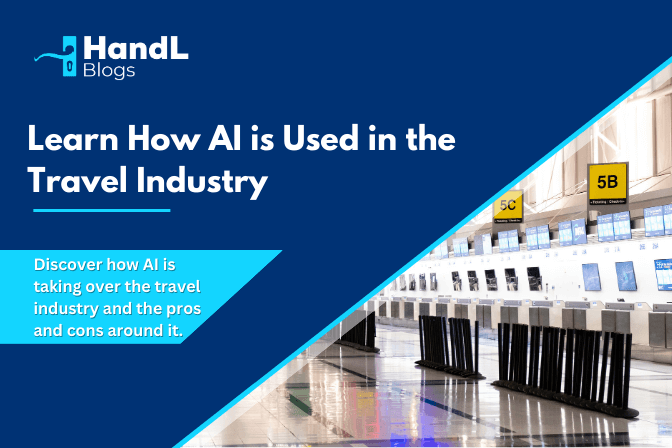
How is AI changing tourism?
With the boom in popularity in AI technology, from Chat GPT and AI chatbots to AI music generators and AI applications, there is a lot to be excited about within the artificial intelligence industry at this point in time.
With that being said, it seems that we are in the midst of a technological revolution and with that revolution it is taken multiple industries by storm, whether that be for the better or worst, you have to adapt or be left behind.
Therefore, with all these new AI tools and tech, how is AI technology affecting the travel and tourism industry? Is there anything that people working within this sector should be worried about and if anyone is planning to go on holiday, is there anything they can do to speed up and integrate artificial intelligence into their own life in order to help create the best trip possible?
Well throughout this article, we will explore all these possibilities and more, focusing on how AI is used in the travel and tourism industry.
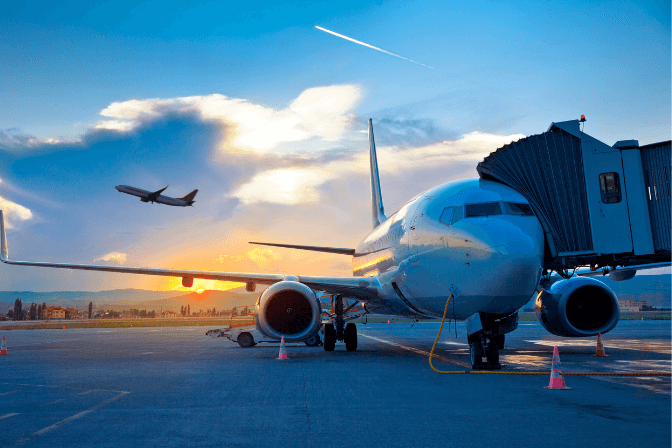
Exploring the positives and negatives of AI in the travel and tourism industry
There is plenty to shout about with AI technology in the travel industry and so much is changing although many see these changes as positive, there are also a fair few who deem these changes as a negative impact on those within the tourism industry.
Throughout this article, we will discuss the advantages and disadvantages of AI technology and the impact it has had on the travel industry.
Some of the most recent innovations within the travel industry that are set to take over are the following:
- AI Travel Bots and Virtual Assistants
- Smart Travel Planning
- Language Translation
- AI Facial Recognition
- Smart Baggage Handling
The role of AI within the travel industry
Artificial intelligence has continued to revolutionize and adapt the travel industry that we all know and love. From providing personalized recommendations, effective customer service and an overall enhanced travel experience for those going on holiday and backpacking the world, AI has made a huge impact on travel and this only looks to grow and move forward.
The role of AI within the travel industry in this day and age is prevalent from when you step into Airports to check your baggage in and pass security to when you check into your hotel. From start to finish your entire travel journey is influenced by AI. Whether that is creating and planning a travel itinerary to finding the best deals on your accommodation and flights. Artificial intelligence is everywhere and its role within the travel industry is extremely prevalent even if you don’t realise it yet.
1. AI Travel Bots and Virtual Assistants

Overview:
One of the biggest influences within online platforms is the use of artificial intelligence acting as chatbots, virtual assistants and travel advisors. Essentially taking a role as an online travel agent, many travel companies such as hotel and accommodation websites to flight companies have all integrated some sort of online AI assistant.
Not only are AI chatbots becoming more of a trend on travel company websites but they also help to improve the user experience for those looking to book online, helping to be that final prompt to encourage bookings. AI can respond to users’ prompts and questions regarding a particular service making it the perfect customer service experience because even when a staff member is not working or is unavailable it can still provide a sufficient answer. Customers ask for faster and faster response times and with AI, travel companies can cater to that demand.
One example I recently came across was on one hotel website, which I was booking out of working hours so there would have been no employees around to assist me if I called up. instead, I asked the AI chatbot whether there was breakfast included in the price of the stay and what times it served and the bot was able to give me an instant answer which would have only of took a few seconds of my time. Put this in comparison to if I rang up and spoke to a staff member, that answer would have taken me at least a few minutes to get and a lot more effort. This led me to actually book this hotel meaning that the AI bot actually helped convert a user and the company didn’t even need to pay him a commission on top of it!
Positives:
- Instant replies for customers looking for answers.
- The AI chatbot is accessible 24 hours a day, 365 days a year.
- The company doesn’t need to pay an actual staff member to be available all night.
- Can respond to multiple users at one time.
- Easy to use for users online.
Negatives:
- Can provide inaccurate and unfulfilling answers for some queries meaning users will become frustrated and leave the website.
- Can be difficult for some users to use with some visitors preferring to use “traditional methods” and speak to a human on the phone.
- Only works on the website and is an internet resource.
- Can be costly for small businesses to set up on their website.
- This can result in a loss of jobs for hotel staff.
2. Smart Travel Planning

Overview:
Travel planning is one of the most important aspects of a holiday and traditionally it was a time-consuming process that required a lot of experience, time and research. On the other hand, you could also get certain travel agents and travel planning companies to cater and create travel itineraries and travel plans for your trip.
However with the rise of AI tools and technology, no research is required and you can simply generate and highly detailed and customisable AI travel itinerary that is designed to your specific needs, for free and as quickly as in five minutes or less. These AI travel itineraries and smart travel plans are produced in high detail and can be totally customizable to your plans and budget. Therefore if you want to see and do specific things at a certain price, artificial technology can do that with ease in a matter of seconds.
To create your own AI travel itinerary, we have crafted a guide that walks you through a step-by-step guide on different AI tools that can help you create a detailed itinerary in minutes for free. Read our AI travel itinerary guide online today.
Positives:
- Is incredibly time efficient helping you to create a detailed and custom travel itinerary in less than five minutes in total.
- Most AI travel itinerary generators are free to use and available online.
- Can help save you effort in researching places.
- Provides incredible customisation options so you can create a travel plan that is completely tailored to your wants and needs.
Negatives:
- There is a lack of human and personalized touch, with AI not knowing the personal experiences and how good these places they are suggesting in the travel plan actually are.
- It may sometimes provide unexpected and inaccurate results based on old places that may be shut or closed down.
- They lack the accurate representation of price which may change day to day.
- Lack of flexibility within the travel plan that is generated.
3. Language Translation
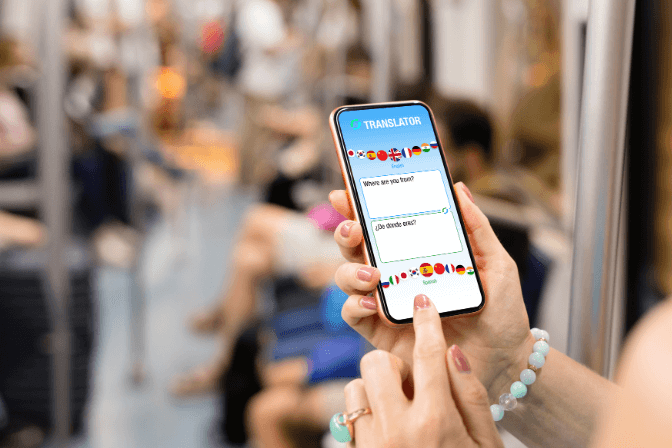
Overview:
Language translation tools based on artificial intelligence technology are incredibly efficient and helpful in the modern era. These language tools that depend on AI can help you get out of some sticky situations when travelling abroad.
AI translation tools use machine translation that automates the conversion of one language to another. It converts text from a source language and creates an equivalent passage in the target language that you have specified. One of the major tools that people use for language translation is, of course, Google Translate.
As an avid traveller myself, AI language translation tools are a huge benefit to people who do not speak their native language when visiting a certain country. These tools have got me out of plenty of situations where neither of us spoke a dialect that we could understand however we conversed through an AI language translator and were able to achieve a form of communication that would not have been possible without the help of artificial intelligence.
Positives:
- Make it super easy to communicate without having to learn a new language.
- AI translation tools are the most efficient way of translating using a tool.
- AI translation tools are continuously developing and improving.
- Most AI translation tools are free to use on the internet.
- Easy to access by simply using a tool online.
- Some AI translation tools contain a talk-to-translate button.
Negatives:
- Requires an internet connection.
- Can be inaccurate in translating some phrases causing confusion.
- Has a hard time understanding the context of a specific phrase.
- Can inadvertently create and present cultural biases from the training data it uses.
4. AI Facial Recognition
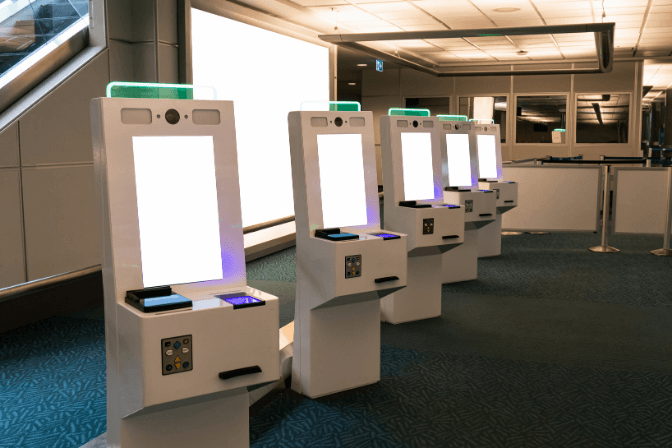
Overview:
AI facial recognition systems have begun popping up in airports all over the world. Not only are these systems super secure allowing the AI to detect people on wanted lists instantly but they also speed up the process of border control times in airports by 10x the amount. They rely on using biometric passports reading the biometric code that is installed within these passports.
There is no need to hire as many border control staff members when you can install ten of these ai facial recognition systems that are far more quicker and efficient. You simply insert your passport photo into the machine, it reads it and then compares your photo with a real-life live image that then uses facial recognition software to let you into the country. Whilst it is doing this, it also checks for security purposes and will disallow you into the country if you are on any wanted lists.
When I used these AI facial recognition tools to get into a country through border control in an airport, although they are far more efficient and quick, sometimes they can cause issues which result in you being rejected. This results in an even longer wait for the one or two human border control staff members who will check you in manually. It is an annoying problem however more often than not the tech works instantly and you aren’t waiting around for too long.
Positives:
- AI facial recognition systems help improve airport security by actually identifying the individual’s face and matching it against a watchlist of criminal activity.
- The automated system is easier to use.
- The automated system is much more quicker to use, reducing the time you have to wait after getting off your plane at border control.
- Helps save the airport money by not having to employ as much border control security.
- Improved accuracy of facial recognition.
- Can act as a deterrent to criminals who may think they cannot fool the AI technologies.
Negatives:
- The use of facial recognition technology raises significant privacy concerns to do with the storage of biometric data.
- The AI system can be temperamental in certain instances where the machine doesn’t identify the correct face from the passport photo.
- Can give false positives and false negative results.
- Some facial recognition software has been known to inhibit certain biases against certain demographics of people.
- Can be difficult for some people to understand how to use the system.
- This can result in a loss of jobs for border control staff members.
5. Smart Baggage Handling
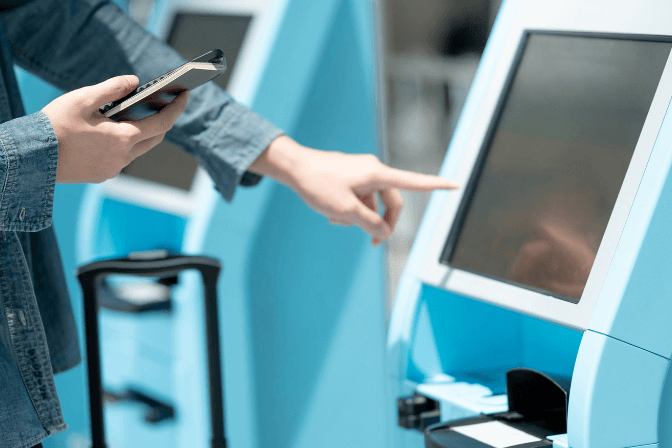
Overview:
Smart AI baggage handling is another incorporation of artificial intelligence into the travel industry. Similar to AI facial recognition being implemented into airports to increase efficiency and speed, so has smart baggage handling systems.
AI can be used to sort your luggage and baggage more efficiently reducing the risk of lost baggage and speeding up the time it takes to check in your luggage when at an airport. You may have noticed that the wait times for checking in your luggage have significantly decreased as the years have progressed and implemented this new AI technology.
I remember back ten years ago when you would have to wait hours to check in your luggage at the airport and there would be lots of staff members trying their best to check people’s luggage in and ensure it gets sent to the correct place. However, with this new smart baggage handling system, you can weigh your own luggage, print out the sticker and get it sent off all by doing it yourself on the machine. This has significantly reduced the need for staff members with now only a few standing out and about to help advise you where as before they would have done the whole process for you themselves.
Positives:
- Improved efficiency in processing and transporting your luggage so you don’t have to wait as long before checking into your flight.
- Reduces the cost of having to employ additional staff for the airline.
- AI algorithms can track and identify baggage reducing the chances of it being lost or misrouted to the wrong plane.
- Real-time monitoring and tracking provide peace of mind and clarity to staff members and customers on the status and location of their luggage.
- Improves security measures as the luggage is more trackable.
Negatives:
- Installing and purchasing AI baggage handling systems for airlines can be extremely costly for the infrastructure.
- The AI systems are not fully reliable and a fault in the system can have major consequences for people’s belongings and an enjoyable trip.
- Can impact the workforce negatively by reducing the need for as many employees meaning people are let go.
- Can be difficult for people to understand and get used to operating the AI system.
Conclusion
With the continuous evolution in technology and the artificial intelligence landscape, it is an interesting time to be in the travel industry. Not only are these new features and tools new to the travel industry but they offer an unprecedented monumental shift in the landscape of everything from jobs in the tourism business to users who are travelling abroad on holiday.
Will the process and the way of travel change? Potentially. However, it is still down to fate and a waiting game to see how fast and how quickly AI technology can integrate into everyday life and this includes the travel industry.
It will be interesting to see how AI continues to evolve and change the world around us and when it comes to the travel industry it will be fascinating to see how this affects job positions in everything from travel agencies and travel companies to online customer service and the hospitality business.
No matter whether you view these changes as a positive factor that will look to improve user experience and people working within the travel industry or as a negative factor that will take people out of jobs and ruin the way we know to travel as it is. One thing is for certain and that is AI technology is here to stay so the tourism industry better adapts to artificial intelligence or you will get left behind.
Read Travel Blogs and More
Disclosure: Some links in this article may be affiliate links, which can provide compensation to HandL Blogs at no cost to you if you decide to purchase through these links. These are products we have personally used and stand behind. This site is not intended to provide financial advice and is for entertainment only. You can read our affiliate disclosure in our privacy policy.

Luke Iles
Luke is a leading travel writer within the travel niche and is also a co-founder of HandL Blogs one of the UK’s leading travel blogging websites. Luke has a love of all things travel.
Initially becoming friends with his other co-founder, Harry, at the age of four years old, they let their love for travel evolve, making it their mission to visit every country in the world!
Today they want to share their passion and experiences of travelling across the globe with written blogs on topics that are most important to them. From travel, cooking, fitness and tech blogs!
Whether that be trying new food in a new country and sharing it in a cooking blog; visiting a new gym in a certain city and reviewing it in a fitness blog or learning about the newest tech within the travel industry.
Disclosure: Some links in this article may be affiliate links, which can provide compensation to HandL Blogs at no cost to you if you decide to purchase through these links. These are products we have personally used and stand behind. This site is not intended to provide financial advice and is for entertainment only. You can read our affiliate disclosure in our privacy policy.
